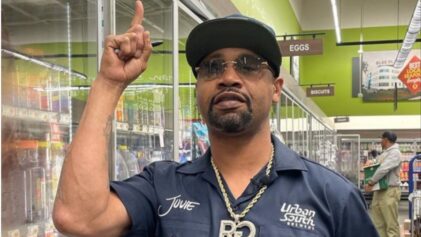A question that must be asked is what does society gain when it charges an 8-year-old child with murder? This is what prosecutors in Birmingham, Alabama must explain, as a Black boy, unidentified, was charged with the October 11 beating death of a 17-month-old girl, Kelci Lewis. Police say they believe the boy became violent when the toddler, with whom he is not related, would not stop crying. The boy’s 6-year-old sister said the boy placed the toddler back in her crib after beating her. Kelci died of blunt force trauma to the head and internal injuries, according to the Washington Post.
The mother, Katerra Lewis, 26, was charged with manslaughter for leaving her daughter alone with children aged 2, 4, 6, 7 and 8, and was released on $15,000 bond. According to police, Lewis and a friend left the home where they were staying, leaving the six children alone, and were at a nightclub when her daughter’s death occurred.
“The 8-year-old just recklessly, viciously dealt with the 1-year-old” said Lt. Sean Edwards, the police spokesman, according to the New York Times. “Most mothers that I know would never have done something like this, but it definitely sends the message that this type of behavior, this type of irresponsibility on behalf of a parent is totally unacceptable.”
The boy is the youngest known child to be charged by the county. ”
“There are just too many deep rooted issues in this horrific crime,” Birmingham police Chief A.C. Roper told AL.com. “It’s extremely troubling from so many different angles and there are no law enforcement answers to prevent it.”
“We’re still trying to process it as it relates to the suspect,” Edwards said, adding the boy will likely require intense counseling over several years. “It’s one of those cases where it leaves everybody a little puzzled.”
The district attorney–Brandon K. Falls, a white Republican–did not comment on the charges.
In a society that claims to seek rehabilitation, America is built on punishment and retribution. First-year law students have been taught that children, particularly pre-adolescent children, lack the mental capacity and competence to be held responsible for their actions because they lack the mental capacity. Juvenile courts dealt with such matters through rehabilitation and treatment rather than punishment, as Cynthia Ward noted in William and Mary Law School Law Review in 2006. Although this doctrine was accepted for most of the twentieth century, it came into conflict with a growing movement led by politicians to punish children for crime, ostensibly to deter crime, but in reality as a form of retribution.
The United States is cruel to its children. The nation is the only one in the world to sentence children to life behind bars without the possibility of parole, which actually amounts to a death sentence.
“The vast majority of states have taken note of the international human rights requirements regarding life imprisonment of children without the possibility of release,” said Juan Méndez, the United Nations special rapporteur on torture and other cruel, inhumane or degrading treatment or punishment, in a report noting the role of the U.S. as an outlier in this regard.
“Life sentences or sentences of an extreme length have a disproportionate impact on children and cause physical and psychological harm that amounts to cruel, inhuman or degrading punishment,” the report reads.
“These kids have not developed. These are eighth-graders and, in some states, younger than that,” said Dr. Louis Kraus, the chairman of the juvenile justice reform committee at the American Academy of Child and Adolescent Psychiatry.
Kraus told Al Jazeera the practice of sentencing children to prison for life is “a devastating process to even conceptualize.”
“The toughest part is that the crimes children might have committed, as devastating as they may have been, are really in unformed brains,” Kraus added. “These teenagers are not the same as their adult counterparts will be. Many of them are not going to be that same person. They’re going to show greater insight, better empathy, less impulsivity, better reasoning ability in terms of understanding the short- and long-term ramifications of their behavior.”
According to the Montgomery-based Equal Justice Initiative, which represents indigent defendants and prisoners, some 3,000 children have been sentenced to life without parole in America, and 10,000 children are housed in jails and prisons on any given day, where they are likely to face sexual assault and a heightened risk of suicide.
“Many young children in America are imperiled by abuse, neglect, domestic and community violence, and poverty. Without effective intervention and help, these children suffer, struggle, and fall into despair and hopelessness,” the organization said. “Sadly, many states have ignored the crisis and dysfunction that creates child delinquency and instead have subjected kids to further victimization and abuse in the adult criminal justice system.”
The organization seeks the end to adult prosecution of children under 14, an end to the placement of children under 18 in adult facilities, and an abolition of juvenile life and other excessive punishment. Alabama, which has no minimum age for prosecution, has been known to scrape the bottom of the barrel when it comes to the implementation of criminal justice.
“There are going to be very serious questions about whether an 8-year-old has the rational capacity for the proceedings against him,” said Tobie Smith, co-director of the Southern Juvenile Detention Center, to the AP. “They’re gonna take a real look at whether maybe this is more a matter of parental culpability than child culpability.”
In America, Black children–who unlike white youth, are not regarded as children and are therefore treated as much older than they are—are susceptible to criminalization. From the rape trials of the Scottsboro boys accused of the 1931 rape of white women, and the 1944 execution of George Stinney, 14, in South Carolina, to the Central Park Five rape trial in 1989, Black boys are regarded as big, bad, grown Black men by white men who run the criminal justice system.


